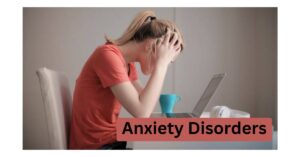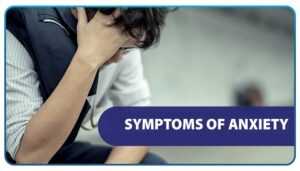In this Article;
• What is Anxiety?
• Types of Anxiety Disorders
• Causes of Anxiety
• Common Symptoms of Anxiety
• Coping Strategies for Anxiety
Prevention
Anxiety Disorders: Types, Causes, Symptoms, Coping Strategies and Prevention

What is Anxiety?
Anxiety is a normal and typical reaction to ~stress or perceived dangers. It is a normal part of the human experience and can even be beneficial in some situations, as it prepares us to respond to danger.
However, when anxiety becomes chronic or overwhelming, it can significantly interfere with daily life and well-being. In this comprehensive article, we will explore the different types of anxiety, their potential causes, common symptoms, and effective coping strategies.
Types of Anxiety Disorders
Generalized Anxiety Disorder (GAD): GAD is characterized by excessive and persistent worry about various aspects of life, such as work, relationships, health, or finances.
Individuals with GAD often find it challenging to control their worry, and this can lead to physical symptoms like restlessness, muscle tension, and difficulty sleeping.
Social Anxiety Disorder (Social Phobia): Social anxiety disorder is characterized by an excessive dread of social circumstances and peer scrutiny.
Individuals with social anxiety may avoid social gatherings, public speaking, or any situation where they feel they might be judged. Physical symptoms, like blushing or trembling, often accompany social anxiety.
Panic Disorder: Panic disorder is marked by recurrent panic attacks—intense and sudden episodes of fear or discomfort that peak within minutes.
These attacks can be accompanied by physical symptoms like a racing heart, sweating, shortness of breath, and a sense of impending doom.
Specific Phobias: Specific phobias involve an irrational and intense fear of a particular object or situation, such as heights, spiders, or flying. Exposure to the phobia trigger can lead to extreme anxiety or panic.
Obsessive-Compulsive Disorder (OCD): OCD is characterized by intrusive, distressing thoughts (obsessions) and repetitive behaviors or mental rituals (compulsions) performed to reduce anxiety. These compulsions can take up a significant amount of time and interfere with daily life.
Post-Traumatic Stress Disorder (PTSD): PTSD can develop after exposure to a traumatic event, such as combat, sexual assault, or a natural disaster. Symptoms include flashbacks, nightmares, severe anxiety, and avoidance of reminders of the trauma.
Agoraphobia: Agoraphobia involves a fear of being in situations or places where escape might be difficult or embarrassing. It often co-occurs with panic disorder and can lead to individuals avoiding leaving their homes.
Causes of Anxiety
The causes of anxiety are multifaceted and can vary from person to person. Some common factors include:
Genetics: Research reveals that anxiety problems may be inherited. You may be more vulnerable if you have a family history of anxiousness.
Brain Chemistry: Imbalances in brain chemistry, particularly involving neurotransmitters like serotonin and dopamine, can contribute to anxiety disorders.
Life Experiences: Traumatic events, such as abuse, accidents, or loss of a loved one, can trigger anxiety disorders, especially PTSD.
Personality Traits: Certain personality traits, such as perfectionism or a tendency to be shy or introverted, may increase the risk of developing anxiety disorders.
Environmental Stressors: Chronic stress due to work, relationships, financial difficulties, or other life challenges can lead to the development of anxiety disorders.
Common Symptoms of Anxiety
Anxiety can manifest in various ways, and symptoms can range from mild to severe. Common symptoms include:
Excessive Worry: Uncontrollable and continuous anxiety about different aspects of life.
Restlessness: Feeling on edge, unable to relax, or experiencing a constant sense of unease.
Irritability: Easily becoming agitated or irritable, often over small matters.
Physical Symptoms: Anxiety can lead to physical sensations such as muscle tension, trembling, sweating, and a racing heart.
Fatigue: Feeling constantly tired or run-down due to the physical and emotional toll of anxiety.
Sleep Disturbances: Finding it difficulty to fall asleep or having a peaceful sleep.
Cognitive Symptoms: Racing thoughts, difficulty concentrating, and a sense of being easily distracted.
Avoidance: Avoiding situations or places that trigger anxiety, which can lead to social isolation.
Panic Attacks: Sudden and intense bouts of fear or discomfort, accompanied by physical symptoms like chest pain or shortness of breath.
Coping Strategies for Anxiety
Managing anxiety involves a combination of self-help strategies, professional treatment, and support from loved ones. Here are some effective coping strategies for anxiety:
Breathing Techniques: Deep breathing exercises can help calm the body’s stress response. Try inhaling slowly through your nose, holding your breath briefly, and then exhaling slowly through your mouth.
Progressive Muscle Relaxation: This technique involves tensing and then relaxing different muscle groups in the body to reduce tension.
Mindfulness and Meditation: Mindfulness practices, such as meditation and mindfulness-based stress reduction (MBSR), can help individuals stay present and reduce anxiety.
Exercise: Regular physical activity has been shown to reduce anxiety by releasing endorphins and promoting relaxation.
Diet and Nutrition: A balanced diet and avoiding excessive caffeine or alcohol can help stabilize mood and reduce anxiety.
Limit Stressors: Identify sources of stress in your life and develop strategies to manage or reduce them. This might include setting limits, allocating duties, or requesting assistance.
Therapy: Psychotherapy, such as cognitive-behavioral therapy (CBT) or exposure therapy, can help individuals learn to manage and overcome their anxiety.
Medication: Medication given by a healthcare practitioner may be required in some circumstances to treat anxiety symptoms. These may include antidepressants or anti-anxiety medications.
Support Groups: Joining a support group can provide a sense of community and understanding among individuals who are facing similar challenges.

Essential Tips to Prevent Anxiety Disorders
Anxiety disorders can be debilitating, but the good news is that prevention is possible. Here are five essential tips to help you keep anxiety at bay:
Stress Management: Develop healthy coping mechanisms for stress, such as regular exercise, deep breathing exercises, or mindfulness meditation.
Healthy Lifestyle: Prioritize a balanced diet, regular exercise, and sufficient sleep to keep your body and mind in optimal condition.
Limit Stimulants: Caffeine and alcohol are stimulants that can increase anxiety symptoms.
Social Connections: Maintain a strong support network of friends and family to share your thoughts and feelings.
Seek Help Early: If anxiety symptoms persist, don’t hesitate to seek professional help. Early intervention can make a significant difference in managing anxiety






